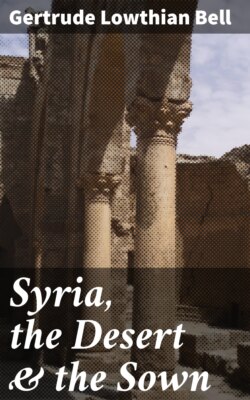Читать книгу Syria, the Desert & the Sown - Gertrude Lowthian Bell - Страница 9
На сайте Литреса книга снята с продажи.
ОглавлениеA ROMAN MILESTONE
Namrūd; "Upon thee! upon thee! oh boy! may thy dwelling be destroyed! may thy days come to harm!"
Beni Ṣakhr: "By the face of the Prophet of God! may He be exalted!"
Sherarāt (in suppressed chorus): "God! and Muḥammad the Prophet of God, upon Him be peace!"
A party in bare legs and a sheepskin:
"Cold, cold! Wāllah! rain and cold!"
Namrūd: "Silence, oh brother! descend into the well and draw corn. It is warm there."
Beni Ṣakhr: "Praise be to God the Almighty!"
Chorus of Camels: "B-b-b-b-b-dd-G-r-r-o-o-a-a."
Camel Drivers; "Be still, accursed ones! may you slip in the mud! may the wrath of God fall on you!"
Ṣukhūr (in unison): "God! God! by the light of His Face!"
At dusk I went into the servants' tent and found Namrūd whispering tales of murder over the fire on which my dinner was a-cooking.
"In the days when I was a boy," said he (and they were not far behind us), "you could not cross the Ghōr in peace. But I had a mare who walked—wāllah! how she walked! Between sunrise and sunset she walked me from Mezerīb to Salt, and never broke her pace. And besides I was well known to all the Ghawārny (natives of the Ghōr). And one night in summer I had to go to Jerusalem—force upon me! I must ride. The waters of Jordan were low, and I crossed at the ford, for there was no bridge then. And as I reached the further bank I heard shouts and the snap of bullets. And I hid in the tamarisk bushes more than an hour till the moon was low, and then I rode forth softly. And at the entrance of the mud hills the mare started from the path, and I looked down and saw the body of a man, naked and covered with knife wounds. And he was quite dead. And as I gazed they sprang out on me from the mud hills, ten horsemen and I was but one. And I backed against the thicket and fired twice with my pistol, but they surrounded me and threw me from the mare and bound me, and setting me again upon the mare they led me away. And when they came to the halting place they fell to discussing whether they should kill me, and one said: 'Wāllah! let us make an end.' And he came near and looked into my face, and it was dawn. And he said: 'It is Namrūd!' for he knew me, and I had succoured him. And they unbound me and let me go, and I rode up to Jerusalem."
The muleteers and I listened with breathless interest as one story succeeded another.
"There are good customs and bad among the Arabs," said Namrūd, "but the good are many. Now when they wish to bring a blood feud to an end, the two enemies come together in the tent of him who was offended. And the lord of the tent bares his sword and turns to the south and draws a circle on the floor, calling upon God. Then he takes a shred of the cloth of the tent and a handful of ashes from the hearth and throws them in the circle, and seven times he strikes the line with his naked sword. And the offender leaps into the circle, and one of the relatives of his enemy cries aloud: 'I take the murder that he did upon me!' Then there is peace. Oh lady! the women have much power in the tribe, and the maidens are well looked on. For if a maiden says: 'I would have such an one for my husband,' he must marry her lest she should be put to shame. And if he has already four wives let him divorce one, and marry in her place the maiden who has chosen him. Such is the custom among the Arabs."
He turned to my Druze muleteer and continued:
"Oh Muḥammad! have a care. The tents of the Ṣukhūr are near, and there is never any peace between the Beni Ṣakhr and the Druzes. And if they knew you, they would certainly kill you—not only would they kill you, but they would bum you alive, and the lady could not shield you, nor could I."
This was a grim light upon the character of my friend Nahār, who had exchanged with me hospitality against a kerchief, and the little group round the fire was somewhat taken back. But Mikhāil was equal to the occasion.
"Let not your Excellency think it," said he, deftly dishing up some stewed vegetables; "he shall be a Christian till we reach the Jebel Druze, and his name is not Muḥammad but Ṭarīf, for that is a name the Christians use."
So we converted and baptized the astonished Muḥammad before the cutlets could be taken out of the frying-pan.
[1]Admirable plans and photographs of the fort have been published by Brünnow and Domaszewski in vol. II. of their great work, "Die Provincia Arabia." This volume was not out at the time I visited Ḳasṭal.
